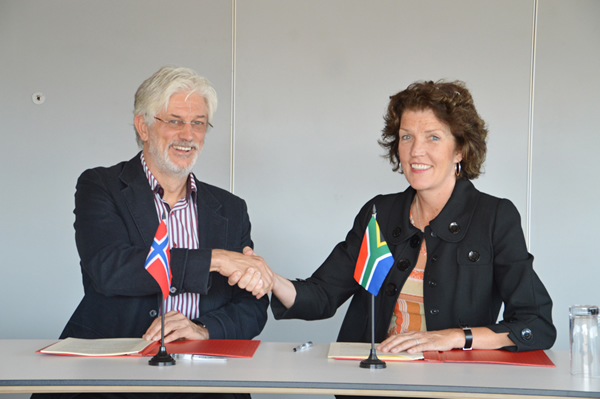The University of Pretoria’s Centre for Human Rights is delighted to announce the signature of a funding contract with the Norwegian Embassy in Pretoria valued at NOK 11 million.
Spread over three years – from 2014 to 2016 – the grant is intended to help strengthen institutions in Africa dealing with governance, the rule of law and human rights in general.
In particular, the grant will support six related projects, to be undertaken by the Centre for Human Rights, namely:
- a series of one-week training courses aimed at strengthening the capacity of African institutions in the field of human rights;
- support to the Human Rights Clinics of the Centre, which aim to undertake advocacy and litigation before African institutions, to fully exploit the potential of these institutions;
- an annual colloquium of African experts on an aspect of democratic consolidation and regionalism in Africa;
- training in state reporting under the African Women’s Protocol and the creation of a web-based platform to further enhance this capacity through the exchange of information and experience;
- capacity building for the Master’s programme (Human Rights and Democratisation in Africa), through support for partner institutions, strengthening the network and impact of graduates through the Alumni Association, and including support to regional institutions dealing with human rights by placing alumni as legal interns to strengthen the inadequate secretariats of these institutions;
- and a project on extrajudicial, summary and arbitrary executions, including support for the research conducted by Prof Christof Heyns, a professor of law at the Centre for Human Rights, in his capacity as the United Nations Special Rapporteur on this topic, and support for regional efforts on this thematic area.
This generous support from the Norwegian government is a continuation of its previous support for the work of the Centre for Human Rights; an endorsement of the successes already realised in these different project areas; and a firm encouragement to consolidate and expand on these results.
Speaking at the signature ceremony, Ambassador Kari Bjørnsgaard was complimentary of the Centre’s track record in helping to strengthen the capacity and output of African human rights institutions, through its training programmes in general, its specialised work in the areas of women’s human rights for example, and its research support for the UN Special Rapporteur on Extrajudicial, Summary and Arbitrary Executions. She spoke briefly of the importance of South Africa’s contribution to human rights and rule of law discourse and action on the African continent, and saluted the fact that the Centre’s work has a reach beyond South Africa and an impact on the the wider African continent at various levels. One week before her departure from South Africa after three years as Ambassador of the Kingdom of Norway, she spoke fondly of her time in South Africa and encouraged the Centre for Human Rights to work closely with her successor – also a woman – who takes office on 1 September 2014.
Prof Frans Viljoen, Director of the Centre for Human Rights, thanked Ambassador Bjørnsgaard and the Norwegian government for their generosity and endorsement, and renewed the Centre’s commitment to realising human rights in Africa by contributing technical and other capacity to existing human rights institutions in Africa. He paid tribute to the support staff at the Norwegian Embassy in Pretoria who played a significant role in motivating for continued support for the Centre’s projects, in particular Ms Siri Andersen and Ms Kegomoditswe Mokgoro, before offering Ambassador Bjørnsgaard all best wishes on her next assignment with the Norwegian Ministry of Foreign Affairs.


